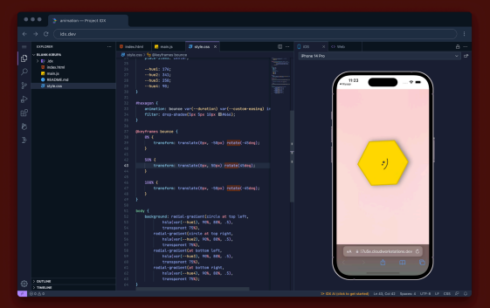

Google today announced several updates to Project IDX, which is a web-based workspace for building multi-platform applications.
Among the updates are the addition of iOS and Android simulators, which can be accessed directly in the browser; templates for frameworks and languages such as Astro, Go, Python, and others; and package manager updates.
“In addition to seeing how you’re using IDX, a key part of building Project IDX is your feedback, so we’ve continued to roll out features for you to test. We’re excited to share the latest updates we’ve implemented to expedite and streamline multiplatform app development, so you can deliver with speed, ease and quality,” Google wrote in a blog post.
The iOS Simulator and Android Emulator can now be accessed in the browser, which allows developers to preview their work without having to leave the Project IDX workspace. The platform also automatically loads up the proper preview environment based on the application developers are working on, such as Safari mobile and Chrome for web, or Android, iOS, and Chrome for Flutter templates.
“IDX’s web and Android emulators allow you to develop, test, and debug directly from your workspace, consolidating your multi-step, multi-platform process into one place. With iOS simulation you can spot-check your app’s layout and behavior while you work,” Google wrote.
Based on user feedback, the company also added several new project templates for many languages and frameworks, including Astro, Go, Python/Flask, Qwik, Lit, Preact, Solid.js, and Node.js.
Improvements were also added to Nix, which is the Project IDX package manager. Now developers will be able to use Nix to customize the starter templates, edit files, and more easily rebuild broken configurations.
Other new features include the ability to auto-detect network ports, run command lines directly from within the workspace, and use Docker within Project IDX.

